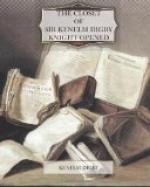In such an embarras de choix as given by all these drink receipts, we may be in doubt whether to try “My Lord Gorge’s Meath,” or “The Countess of Newport’s” cherry wine, or “The sweet drink of my Lady Stuart,” or of Lady Windebanke, or “Sir Paul Neile’s way of making cider,” or “my Lord Carlisle’s Sack posset”; but one is strongly influenced by such a note as “Sir Edward Bainton’s Receipt which my Lord of Portland (who gave it me) saith, was the best he ever drank.” I had thought of Saint-Evremond as warrior and wit, delightful satirist and letter-writer. But here is a streak of new light upon him: “Monsieur St. Euvremont makes thus his potage de sante of boiled meat for dinner being very valetudinary.... When he is in pretty good health, that he may venture upon more savoury hotter things, &c.” The most rigorous Protestants will relax to hear how “To make a Pan Cotto as the Cardinals use in Rome.” And if “My Lord Lumley’s Pease Pottage” sounds homely, be it known, on the word of the eloquent Robert May, that his lordship “wanted no knowledge in the discerning this mystery.” What fastidious simplicity in the taste of the great is suggested by “My Lord d’Aubigny eats Red-herrings thus boiled”!
But if Sir Kenelm consorted only with the great, it was with the great of all social ranks. It was not merely on high questions of science he discoursed with the discoverer of the circulation of the blood—witness “Dr. Harvey’s pleasant water cider.” Then there was that “Chief Burgomaster of Antwerpe,” with whom he must have been on pretty intimate terms, to learn that he “used for many years to drink no other drink but this [mead]; at Meals and all times, even for pledging of healths. And though He was an old man, he was of an extraordinary vigor every way, and had every year a Child, had always a great appetite, and good digestion; and yet was not fat.” Digby was too great a gentleman to be above exchanging receipts with the professors of the “mystery,” such as the Muscovian Ambassador’s steward; and when “Master Webbe who maketh the King’s meath,” on the 1st of September, 1663, came to his house to make some for him, Sir Kenelm stood by, a little suspicious lest the other great artist was bamboozling him. He had an eye for all—though it may have been one of his correspondents who says of the remnants of a dish that it “will make good Water-gruel for the Servants.”
The seriousness of the business is tremendous; and to ignore the fine shades in the 106 receipts for mead and metheglin would have been a frivolity unknown in Digby’s circle. There is care; there is conscience; there is rivalry. The ingredients are mingled with a nice discrimination between the rights of the palate and the maintenance of health. “Use only Morello cherries (I think) for pleasure, and black ones for health.” You may not wait your own convenience in such serious business. “It is best made by taking all the Canicular days into your fermentation.” Now and again




